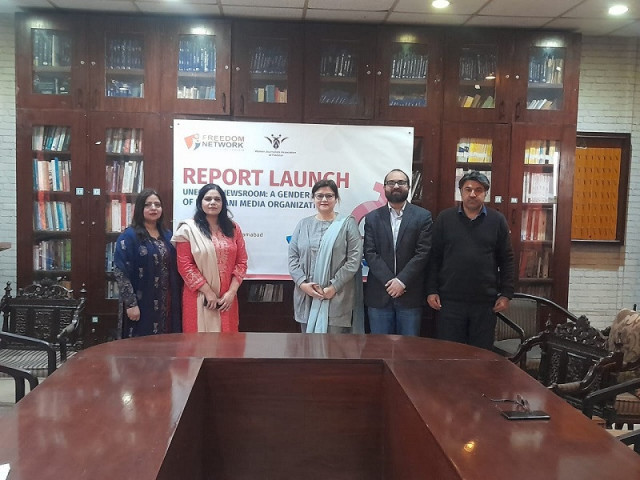Media industry facing ‘gender emergency’: report
WJAP, Freedom Network report reveals share of women journalists at news outlets is only 11%

A gender audit conducted by the Women Journalists Association of Pakistan (WJAP) and Freedom Network has shed light on the dire under-representation of women journalists in newsrooms and the absence of gender-sensitive policies within the media industry.
Termed a "gender emergency," the findings of the audit point to systemic challenges that need urgent attention to ensure gender equality and a safe working environment for women in the media sector.
Titled "Unequal Newsrooms: A Gender Audit of Pakistani Media Organisations," the study was launched in conjunction with International Women’s Day on March 8th. The audit focused on 15 news organizations in Islamabad, including TV channels, newspapers, news agencies, and news websites, assessing workforce representation, organisational policies, anti-harassment measures, working conditions, and wages.
One of the key findings of the audit is the glaring under-representation of women journalists, with only an average share of 11% across the audited news outlets. Furthermore, a majority of the organisations have no women journalist in leadership positions, highlighting a significant gender disparity in decision-making roles within the industry.
Alarmingly, despite a federal law mandating the establishment of anti-harassment inquiry committees, only two out of the 15 media houses have implemented such committees. Additionally, most organisations fail to provide paid maternity or paternity leave, disregarding legal requirements and further exacerbating gender inequalities in the workplace.
The gender sensitivity assessment of the audit report reveals that around 75% of the audited news outlets exhibit a gender-blind approach in their organisational policies and practices, neglecting to address gender-specific issues that affect men, women, and other gender minorities differently in the workplace.
Commenting on the findings, Fauzia Kalsoom Rana, the founder and convenor of WJAP, emphasised the need for media managers to reflect on the situation in their organisations and implement measures to improve working conditions for women journalists.
Read also: Gender parity report launched
“The male-dominated policies and practices of media houses create additional gendered challenges for women journalists and media workers,” she said. “Media houses should use the findings of the gender audit to review their internal systems and implement measures to improve working conditions for women.”
Myra Imran, WJAP advisor and Vice-president of the National Press Club, highlighted how the lack of gender diversity in newsrooms not only impacts the quality of journalism but also limits women's access to information and representation in media content.
“If there are few women in the newsrooms, then women’s perspectives will naturally get ignored in media content,” she said. “Media organisations should introduce gender equality at the workplace including in leadership positions, produce more gender sensitive content, and improve their engagement with women audiences.”
Freedom Network Executive Director Iqbal Khattak stressed the importance of civil society support in implementing gender sensitivity reforms within the media sector, urging news organisations to adopt gender equality as a core value to foster meaningful change in organisational culture.
The audit concludes that urgent actions are required to address the gender emergency in the Pakistani media industry, including the adoption of gender equality strategies, capacity-building training, transparency in contracts and wage structures, seeking legal help against publishers for violations of gender protection laws, and policy interventions to ensure the safety and rights of women media workers.
According to the gender audit, policymakers should take notice of workplace sexual harassment and safety risks to women media workers.



















COMMENTS
Comments are moderated and generally will be posted if they are on-topic and not abusive.
For more information, please see our Comments FAQ